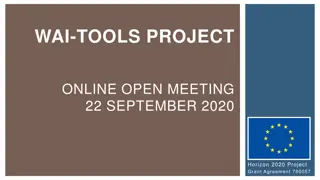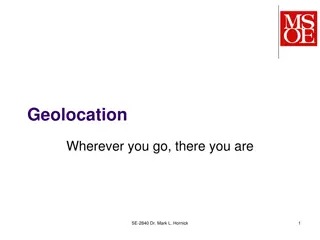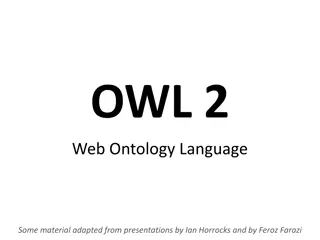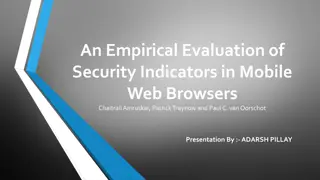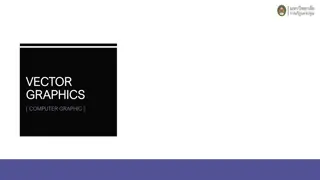Advanced Web Accessibility Tools Project Overview
The WAI-Tools Project under Horizon 2020 aims to enhance web accessibility assessments with advanced decision support tools. Key elements include introducing progress on Accessibility Conformance Testing (ACT) Rules, updates to national observatories, WCAG-EM Report Tool, and large-scale accessibili
2 views • 15 slides
Understanding Geolocation: What You Need to Know
Geolocation is a built-in browser functionality that allows web applications to be location-aware. It uses geographic latitude/longitude and is supported by all modern browsers, making it an integral part of the HTML5/W3C JavaScript API. With geolocation, you can show users their position on a map,
0 views • 16 slides
Exploring the Fundamentals of Web Engineering
Delve into the world of web engineering with an introduction to its motivation, basic paradigms, conceptual architecture, history, protocol stack, the role of the World Wide Web Consortium (W3C), and the nature of web applications. Understand the categories of web applications and how they provide s
0 views • 51 slides
Creating Accessible Ebooks: EPUB Accessibility Guidelines
Discover the world of accessible ebooks through EPUB Accessibility Guidelines, with insights on Benetech's Global Literacy Program, DIAGRAM Center, and Bookshare. Unveil the agenda, standards, and EPUB's merger into the W3C for enhanced accessibility. Dive into EPUB 3.1 and its Conformance and Disco
0 views • 49 slides
Overview of OWL 2 Web Ontology Language Features
Introduction to OWL 2, its extension from OWL 1.1, and compatibility, new features based on real applications and use cases, adoption as a W3C recommendation in 2009, and the rationale behind features like syntactic sugar, new constructs, extended datatypes, and punning.
1 views • 63 slides
Innovative Phishing-Resistant Cardholder Authentication and Payment Confirmation Method
Introducing a method for cardholder authentication and secure payment confirmation that is phishing-resistant, requires no interaction with the issuing bank at transaction time, and provides merchants with a non-repudiable cryptographic signature on transactions. This innovative approach leverages t
0 views • 8 slides
An Empirical Evaluation of Security Indicators in Mobile Web Browsers
Security indicators play a crucial role in determining the security of web pages on mobile browsers. This study evaluates the effectiveness of security indicators in identifying potential threats such as phishing and man-in-the-middle attacks. The research examines W3C guidelines, mobile browser com
0 views • 25 slides
Understanding WebRTC: Features, History, and Main APIs
WebRTC, a technology enabling real-time communication over the web, aims to facilitate acquiring audio and video streams, communicating data, and integrating RTC with other services. Originating in corporate environments with expensive licenses, WebRTC was championed by Google and standardized by IE
0 views • 21 slides
Understanding Vector Graphics in Computer Graphics
Vector graphics in computer graphics are defined by 2D points connected by lines and curves to form shapes. Commonly found in SVG, EPS, PDF, or AI formats, they differ from raster graphics like JPEG or PNG. The W3C standard for vector graphics is SVG, allowing scalable and resolution-independent ima
0 views • 4 slides
